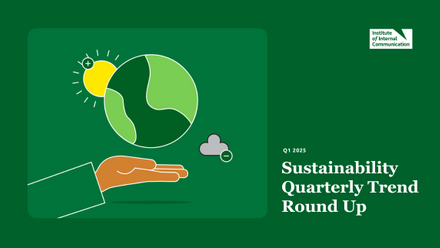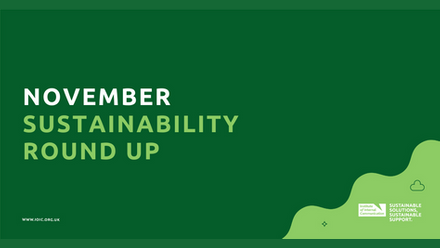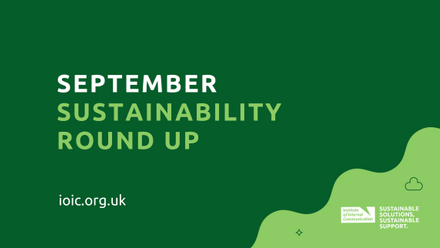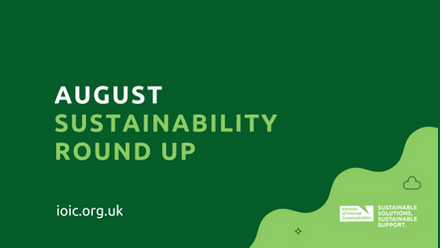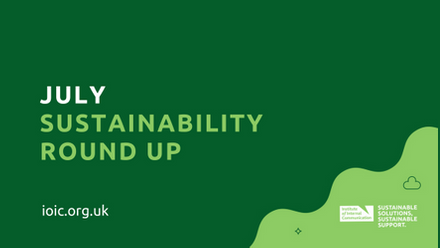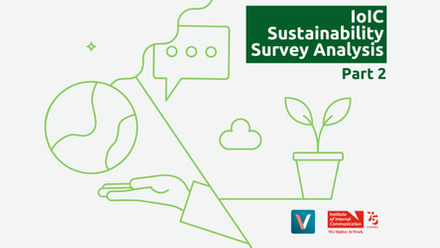October 2024 Sustainability Round Up
Community sustainability
We reported a couple of months back about the growing number of data centres required to power our burgeoning appetite for generative AI. These sites, once relatively obscure behemoths, are now in the spotlight due to their massive energy demands.
With the UK poised for a data centre boom, the tech industry faces growing scrutiny from local communities, environmentalists and investors. The country’s now experiencing its first taste of activism, with residents in North Ockendon opposing a large data centre project. In parallel, community pushback is on the rise as concern grows that these “hyperscalers” are hoovering up local resources.
While the UK government talks about attracting investment by relaxing planning restrictions for building data centres, community rejection of them is growing globally. From the Netherlands to Chile, local groups are challenging these developments over concerns about resource consumption and environmental impact – some claiming their existence is tantamount to “extractivism”, the for-profit exploitation of resources.
Opponents argue for more transparency, regulation and local involvement in data centre planning. Others suggest these centres should be regarded as critical national infrastructure and call for the development of a strategic national plan. This could involve creating clusters near renewable energy sources, potentially boosting regional economies.
As the debate continues, it's clear the need to balance the digital economy's needs with environmental concerns and community interests is only going to grow. The AI industry will need to address these sustainability challenges – and communicate their efforts in this regard – to maintain public support.
Organisational sustainability
Sustainability has become a cornerstone of corporate strategy, with 75% of executives now agreeing it drives better business results. And incorporating sustainability into business strategies can lead to innovation and competitive advantage.
Climate tech is essential for meeting sustainability goals, with two thirds of global executives believing their organisations cannot achieve these targets without it. Generative AI is another tool being used to advance sustainability initiatives, helping with data-driven decision-making and monitoring trends.
- Make measurement and reporting a business imperative
- Invest in climate tech solutions and incorporate circular systems
- Plan for regulatory changes and geopolitical uncertainties
- Prioritise water and biodiversity in sustainability strategies
- Build consumer trust by showcasing actual data and outcomes
As internal communicators, we’re uniquely placed to drive initiatives like these within our organisations – after all, we’re used to effectively conveying complex concepts, engaging employees at all levels, as well as fostering a culture of environmental responsibility.
Our role in helping to translate corporate strategy into actionable results is becoming increasingly pivotal when it comes to the successful implementation of organisational sustainability measures.
Economic sustainability
Research suggests that wealthy nations could potentially raise $5 trillion (ca. £3.84 trillion) annually for climate finance, which would far exceed the $1 trillion (£769 billion) requested by developing countries.
The study by Oil Change International outlines several potential revenue sources to generate this substantial sum, such as a wealth tax on billionaires ($483 billion / £371 billion), a financial transaction tax ($327 billion / £251 billion) and taxes on luxury goods and technology sales ($112 billion / £86 billion). Additionally, redirecting 20% of public military spending could yield $454 billion (£349 billion) globally. They also propose windfall taxes on fossil fuel companies and the re-direction of subsidies some of these organisations receive.
As fanciful as some of these might appear, an approach like this might actually be pivotal for longer-term global economic sustainability. By restructuring financial systems and redirecting funds towards climate action, nations can:
- Reduce dependency on fossil fuels, promoting cleaner energy alternatives
- Invest in resilient infrastructure to mitigate climate-related economic risks
- Foster innovation in green technologies, creating new economic opportunities
- Address wealth inequality, potentially leading to more stable economies
- Promote global cooperation on climate issues, enhancing economic stability
The upcoming UN climate summit, COP29, will focus on setting new climate finance goals, emphasising the urgent need for action and cooperation in addressing the climate crisis. And while some of these issues may seem pretty “macro” and beyond the scope of our own organisational concerns, keeping a weather eye on the bigger global picture when it comes to sustainability is always ging to inform and add context to our individual communication activity.
Environmental sustainability
The Earth may have breached seven of nine planetary boundaries, according to the latest report from the Potsdam Institute for Climate Impact Research. The report builds on years of research identifying nine systems and processes crucial to the planet's life-support functions.
Six of these boundaries have already been crossed, with four in high-risk zones. Ocean acidification is approaching a critical threshold, posing an increasing threat to marine ecosystems and the planet more widely. Only stratospheric ozone depletion remains stable, while atmospheric aerosol loading has slightly improved.
The climate scientists behind the report stress that these planetary boundaries are highly interconnected and cannot be addressed as separate issues. Through annual “planetary health checks”, their research aims to provide a comprehensive risk assessment across all boundaries.
What does this mean for us as internal communicators? As alarming as these facts and statistics about the climate crisis are, they also bring into focus the importance of the role we play in our organisations' sustainability journeys. For instance, we can leverage climate data when we share updates on our own organisations’ progress on their sustainability goals, to remind colleagues of the critical nature of these endeavours. We can also encourage employee engagement in sustainability initiatives by demonstrating the impact of individual and collective actions.
By judiciously communicating these crucial environmental insights, no matter how sobering, internal communicators can help drive meaningful change within their organisations.
Personal sustainability
Bain & Company’s The Visionary CEO’s Guide to Sustainability 2024 report shows that despite rising consumer concern about climate change, some CEOs are deprioritising sustainability in favour of issues like AI, profit growth and geopolitical uncertainty. Consequently, many companies are struggling to meet their existing commitments, with 30% behind on emissions reduction goals.
This shift comes even as research suggests a 2°C global temperature hike could slash a staggering $6 trillion (ca. £4.6 trillion) from the S&P 500's value.
The research highlights how personal experience of environmental impacts is the primary driver for consumers switching to sustainable products. About 40% of consumers cite this as their main reason for making sustainable purchases, outweighing factors like media influence and brand campaigns.
The study also reveals that 61% of people are more concerned about climate change than two years ago, with higher percentages in countries recently affected by extreme weather events. In addition, corporate buyers are prioritising sustainability, with more than a third willing to ditch suppliers that don't meet their environmental expectations.
Interestingly, Bain’s research points to a need for companies to “de-average” consumers and customers, and to regard them less as a monolith and more as a complex ecosystem of specific customer segments.
There are learnings here for the IC community. Ultimately, colleagues are consumers too, and bring their own experiences and preoccupations to the workplace. Increasingly this will shape how we effectively communicate and engage with them.

